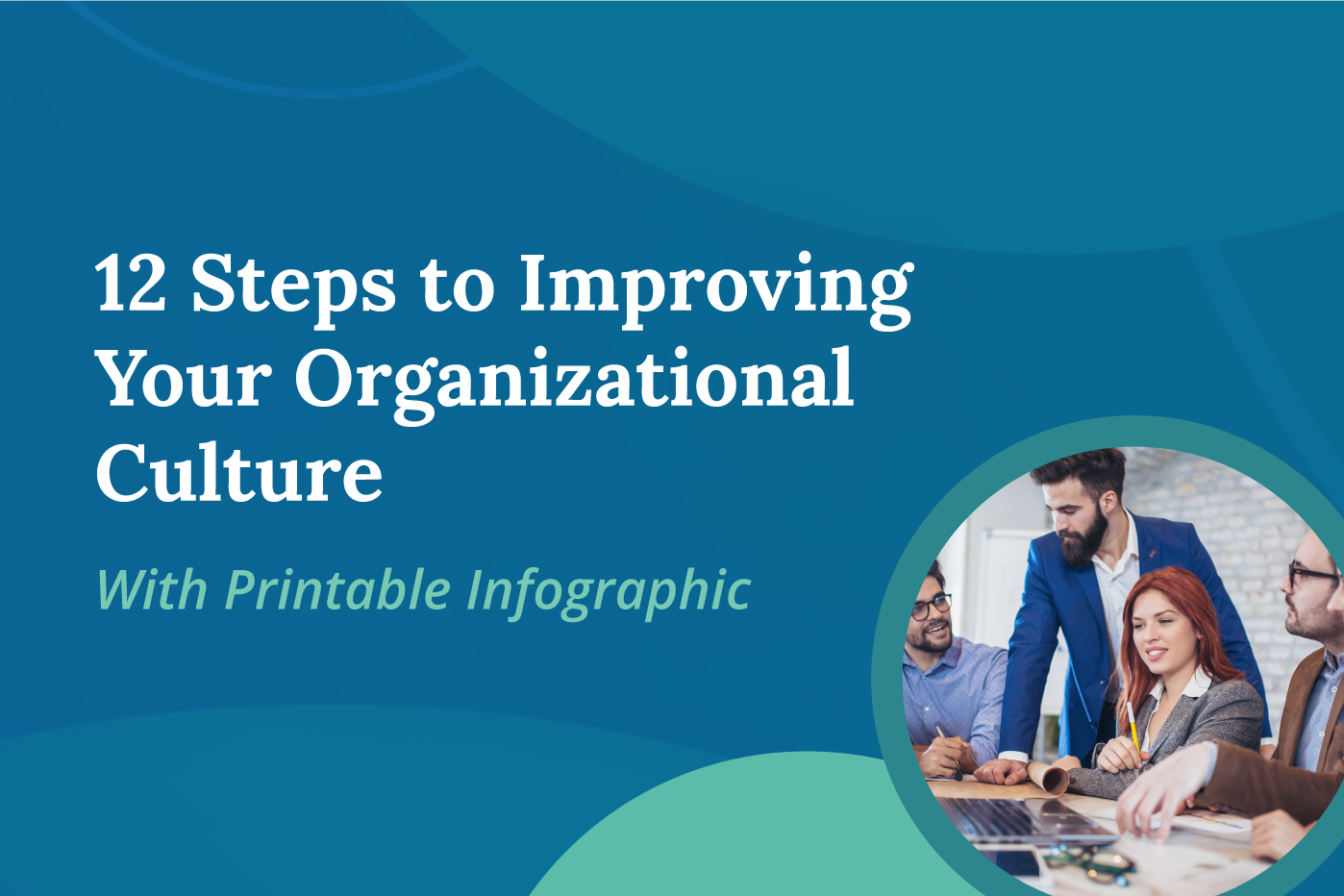12 Steps to Improving Your Organizational Culture
With the end of the year approaching, many organizations are taking time to reflect on the year 2021 and the state of their workplace culture. While reflection is positive, many leaders wonder what they can do to ensure their work environment is healthy and their culture is one where employees are proud to work and remain. The fact that so many leaders have come to us embracing the concept of promoting a healthy workplace through civility and respect speaks to a true paradigm shift in how employers view mental health, work/life balance, and other essential aspects of a healthy workplace.
Although the past two years have been fraught with challenges, hopefully, we can look back on the “pandemic era” as a time when employers fully began to understand the need to maintain a culture that allows their team members to shine without the fears that have bogged down workforces for so many years. The following are twelve steps that can be taken (or reinforced) to improve organizational culture and make your workplace one that employees are proud to be a part of and remain loyal to for many years.
1. Embrace a Speak Up and Listen Up Mentality
In a speak-up environment, employees are unafraid to raise concerns to leadership. In a listen-up environment, leaders and managers are always willing to not only hear the concerns their employees raise with them but also “listen” to the concerns and make the necessary changes to rectify wrongs, even when doing so is difficult or uncomfortable.
When employers embrace a speak up/listen up mentality, employees do not fear adverse consequences for raising concerns or feel their employer will be tone deaf. Instead, employees are more likely to work harder knowing they can bring a problem to leadership and something will be done to address it. Therefore, step one to improving organizational culture is to start encouraging employees to speak up so that they can listen and understand where your weaknesses are and address them.
2. Cultivate Relationships based on Trust and Respect
Employees often complain that their co-workers and managers try to undermine them for personal gain. Such distrust is a hallmark of unhealthy workplace culture. Accountability is critical in developing trust and respect within the organization. When leaders show their employees through their behavior that they can be trusted, they gain the respect of those working for them. Likewise, when employees feel respected, they tend to treat their colleagues with greater trust and understanding and are more likely to help them when needed. Since faith and respect are a two-way street, your organization must ensure that your workforce believes your leaders are honest with them when they say they are there in good times and bad. You must be willing to punish those leaders who are either disrespectful or do something that reflects poorly on their trustworthiness.
3. Remain Flexible in Policy and Circumstance
If the pandemic taught us anything, it is that a lot can be accomplished remotely. Now that we have had nearly two years of a majority of the American workforce working remotely, we can actively say that productivity has not dropped (and in some cases, it has increased). Despite pandemic fatigue and fear, most employees are happier now with their work-life balance, while most employers claim productivity has remained high. Therefore, your organization must be flexible in its policies to keep up with the new world working order. This leads back to step 2 (trust). When you trust your employees to get their work done in a less traditional environment, they are more likely to respect the organization for giving them the flexibility to do so.
4. Foster and Organizational Philosophy (and Stick to it)!
A common complaint among employees is a lack of knowledge about the organizational philosophy “du jour.” When employees work in organizations where the targets are constantly in motion, the goals invariably seem much more unattainable. Therefore, your leaders must formulate an organizational philosophy and stick to it to improve your workplace culture. This means you may have some difficult choices that might be initially unpopular, but over time you will gain tremendous respect from the workforce if you are willing to stay the course through good times and bad.
5. Ensure Team Members Take Away Personal Enrichment from Education
When many employees think about training, they think about formulaic modules aimed at decreasing the liability on the organization in the event something goes wrong. This is an outdated approach. The best training now allows employees to learn something about themselves and take away concepts they can use in their life away from the organization. Sometimes this may come in the form of education on relationship building and emotional intelligence that the learner can use at home. Other times it may be core skill building that is useful not just at their current place of employment but throughout their career. By providing meaningful opportunities for education and training, employees can gain takeaways that lead to overall enrichment and reflect upon what they have learned to improve the organization as a whole.
6. Return to the Idea of Mentorship
Once upon a time, workplace cultures were built on the idea of a well-experienced mentor guiding less experienced employees in the ways of the organization and passing along skills that can only be gained through experience. Somewhere along the line, organizations began to expect new employees to “hit the ground running.” Unfortunately, doing so is easier said than done. Healthy organizational cultures nowadays are returning to the idea that mentors are essential. In addition to the education, they can provide, the concept of two-way respect (mentors can learn from new employees as well) benefits the organization. If you are not running a mentorship program at your workplace, you should strongly consider implementing one and ensuring it is fully utilized.
7. Promote (and Reward) Teamwork
Like the concept of shared ideas through mentorship, teamwork is essential to a healthy organizational culture. In those organizations where employees feel less a part of a linear organizational hierarchy and more a part of a team, they are more likely to work hard and try and contribute. Additionally, employees frequently cite teamwork as one of the most important aspects of healthy workplace culture. Suppose you feel your organization has become too stratified. In that case, you should re-evaluate to ensure good teamwork concepts are utilized. If you think you have a proper teamwork structure, you should ask your workforce, as their view of the situation may differ! If there is a disconnect, ensure that you are willing to make the proper adjustments, and you will find that your employees develop a tremendous respect for leadership and the organization as a whole.
8. Ensure Employees Understand the Role of Culture in a Healthy Work Environment
The steps above are critical to improving and maintaining a healthy workplace culture. Still, if employees do not understand the role culture plays, it is up to the organization to make them know. Doing so is not just about the education suggested but also in culture committee events and communications that make the organization committed to ensuring its workforce’s health. You may be surprised how many employees do not consider culture when evaluating an organization. Still, once they begin to understand it, they may see deficiencies they did not know existed.
9. Be Transparent
For many years organizations attempted to hide problems to “protect” their workforce. This approach bred distrust within the organization and made employees unwilling or afraid to speak up about their concerns. Modern healthy organizations are transparent about positive things happening within the organization and when there is a problem. By being transparent about difficult situations, your leadership skills can shine through, and your workforce will develop a tremendous respect for the difficult conversations you are willing to have. You should not fear what happens after you reveal difficult news; instead, consider the implications if your workforce finds out about it from another channel.
10. Make Valuable Employees Feel Rewarded
It is one thing to have high expectations, but employees should feel rewarded when they meet and exceed those expectations. This does not just mean financial rewards such as raises and bonuses; success should be promoted throughout the organization (and publicly if the success lends itself to external communication). By ensuring employees feel valued, the organizational culture improves, as those who strive to achieve success will know their value will be recognized. This concept also leads back to respect within the organization, both for the employees who are having success and the organization for promoting and rewarding that success.
11. Encourage Passion and Compassion
Too often, employers equate passion to “complaints.” This is often the wrong analysis, as passionate employees care about the organization and their work within it. Therefore, healthy organizational cultures not only encourage a passion for the job and the environment but are also compassionate about problems that may be going on in the lives of its workforce. When an employee appears to be having a bad day, it is up to organizational leadership to make that employee feel better in any way it can. Sometimes the employees are unwilling to share what is going on (given it may be personal). Still, the organization and leadership can ensure that employees are supported, and the organization will do anything the individual needs. This compassion leads to a more extraordinary passion for the place someone works and positively impacts organizational culture.
12. Have Zero Tolerance for Disrespect and Incivility
Finally, organizations must make clear to their workforce that they have zero tolerance for disrespectful or uncivil behavior at work. This goes far beyond rectifying illegal harassment or bullying but ensuring that people treat one another in a manner they would choose to be treated outside work. When the organization hears a complaint of incivility, it should immediately investigate the issue and confront the accused. Following a discussion of the acts, the incident should be documented and the victim apprised of the process. Doing so not only informs the lousy actor that their behavior will not be tolerated but also gives the victim a sense of security that the organization will do everything it can (immediately) to cure the wrong. This must be not only the policy but also the practice.
Syntrio wishes your organization a happy, healthy, and respectful 2022. We welcome the opportunity to discuss how our products can help you implement the strategies above and would be glad to demonstrate the variety of ways we are working with businesses to continue moving forward in the critical area of workplace culture. Contact us today to discuss how we can formulate a strategy for your success in the new year.



